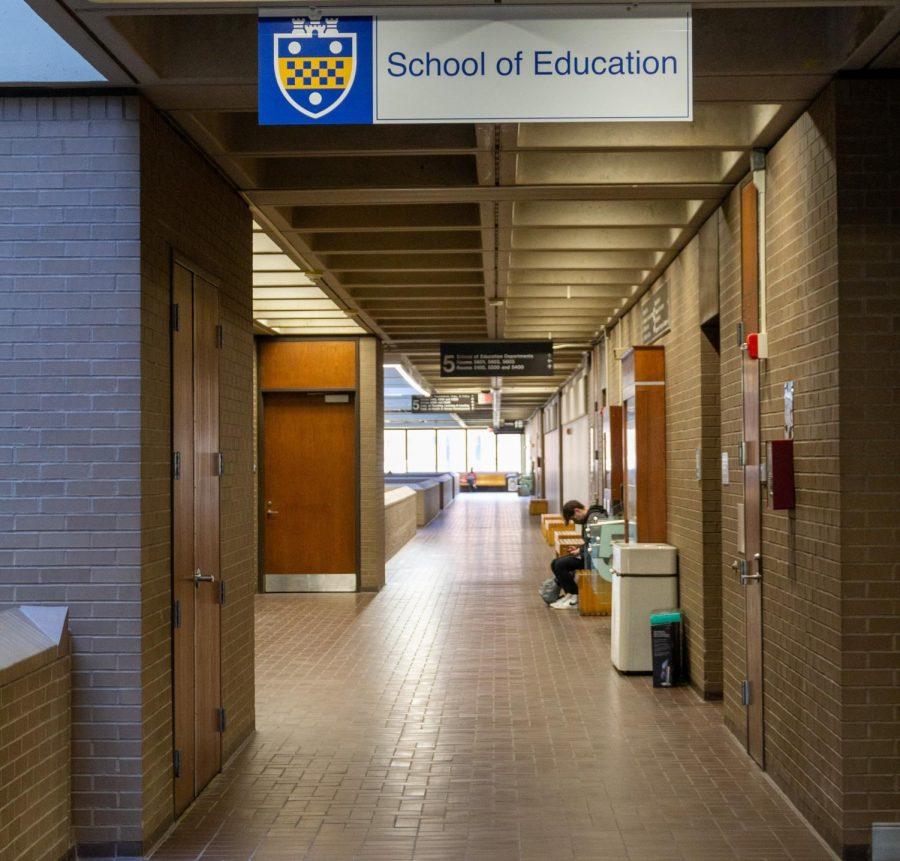School of Education offers new undergraduate major
John Blair | Senior Staff Photographer
The halls outside the School of Education on the fifth floor of Wesley W. Posvar Hall.
November 29, 2021
Currently, Pitt only offers a teaching degree at the graduate level, which leaves students interested in this career with two options — go to a different university or pursue Pitt’s master’s degree after graduating. But soon, students will have a third option.
Pitt’s new Bachelor of Science in Teacher Education program will begin accepting students — including recently graduated high school students and transfer students — for the fall semester in 2023, according to a press release from Pitt’s School of Education. The program will have six academic tracks — one in special education for grades pre-K through 12 and five others in mathematics, social studies, science, foreign languages and English for grades seven through 12.
Each of these tracks fulfills the Pennsylvania Department of Education certification guidelines. Students also will be required to complete a student teaching practicum, where they will be supervised by a mentor teacher in a local school district.
According to Michelle Slobak, a professor in the School of Education who helped design the major, students will spend their first and second years focusing on general education requirements and a subject they want to teach, and then transfer to the School of Education to study one of the six areas of concentration.
Slobak said if Pitt becomes recognized as an institution which offers high-quality teachers at an undergraduate level, then the program will be a “success.”
“I think we already have that reputation in the region and nationally at the graduate level, but that’s a big change,” Slobak said. “With that change in reputation, I think we hope to have increased enrollment.”
Pitt used to offer an undergraduate major in teaching but it was removed decades ago. The School of Education currently offers a minor in teacher education, which is meant to prepare students for graduate school. Students who are interested in applying for the major can fill out a survey to be put on the waiting list.
Valerie Kinloch, the dean of the School of Education, said the new major will give graduates the certification to teach in the state of Pennsylvania, meaning they can teach right after they graduate college. While Kinloch said it’s important that Pitt’s new major gives students the ability to teach in Pennsylvania, she is more proud about making the field more diverse.
“Even more important is that these areas and our new program will move forward our School’s commitment to equity, justice and innovation in teaching and teacher education for those seeking teacher certification and for those who might not seek certification, but want to strengthen their engagements in education within community and non-school contexts,” Kinloch said.
Kinloch also said she hopes the new degree will expand educational equity, further the initiatives in learning and teaching and make education a more accessible career.
“My hope is that our new program will support students who want to not only think about pedagogical and curricular practices, but who want to lead initiatives in teaching, learning and leading,” Kinloch said.
Sheila Conway, a professor in the School of Education who helped design the major, said offering special education helps to alleviate the shortage of special education teachers in the country.
“So we have kids out there in schools with disabilities who don’t have qualified teachers or high-quality teachers,” Conway said. “Pitt students are great, smart, dedicated students who are really dedicated to social justice in my experience. So those are the kinds of people we want in special ed.”
Slobak, along with eight other members, made up the “Reimagining Teacher Education Committee” — the group which designed the major. This committee visited other universities that offered an undergraduate teaching degree to help them create Pitt’s.
“This was really a collaborative effort across the faculty in the School of Education,” Slobak said. “A group of faculty started this work and this faculty covered different content areas and different expertise across what we offer at the graduate level. We also visited other universities who offer undergrad teacher education that were aspirational to us.”
In order to obtain the teaching degree, students will practice teaching at schools in Pittsburgh and surrounding suburban areas. According to Conway, students will be spending 20 hours a week in a classroom student teaching.
“We place a lot of our student teachers in Pittsburgh Public Schools, and we’re situated right in the middle of a large urban dish. They’re a great partner for us,” Slobak said. “We have many excellent school districts, including Pittsburgh Public, that are ideal places to student teach.”
According to Slobak, the major works to achieve equity in education by reducing the cost of becoming a teacher — which would normally require a master’s degree — making the career a more viable path for a wider group of students.
“We’re focusing on addressing cost. So becoming a teacher at the graduate level is expensive,” Slobak said. “It’s cost prohibitive for some students.”
Slobak added that the teaching field is overwhelmingly white middle-class women. According to Education Weekly, as of 2020, the average teacher is a 43-year-old white woman with nearly a decade and a half of teaching experience. She said she hopes that by offering a major which allows students to get an undergraduate teaching degree, Pitt can increase diversity in the field.
“We want to start to move that needle on graduating students with varied identities,” Slobak said. “Teaching can be an overwhelmingly white middle class, women’s profession. And can we start to move that metric as well as keep those same students who have those identities engaged and best prepared to teach all students?”



